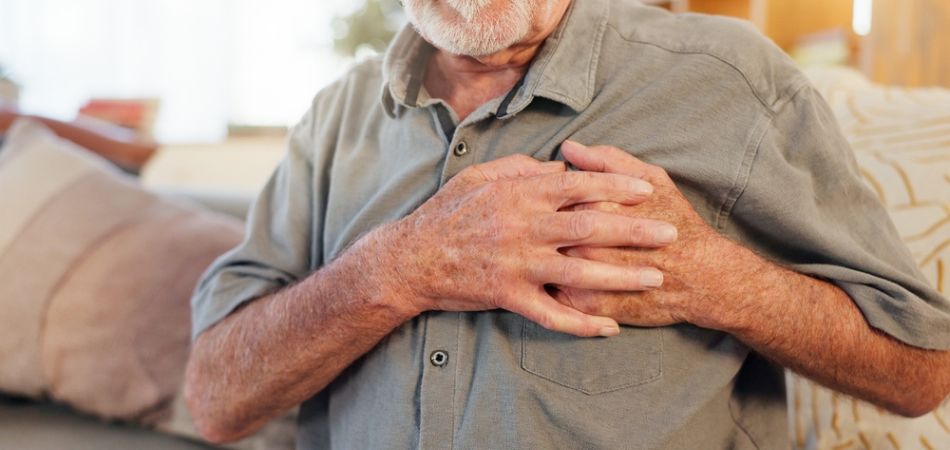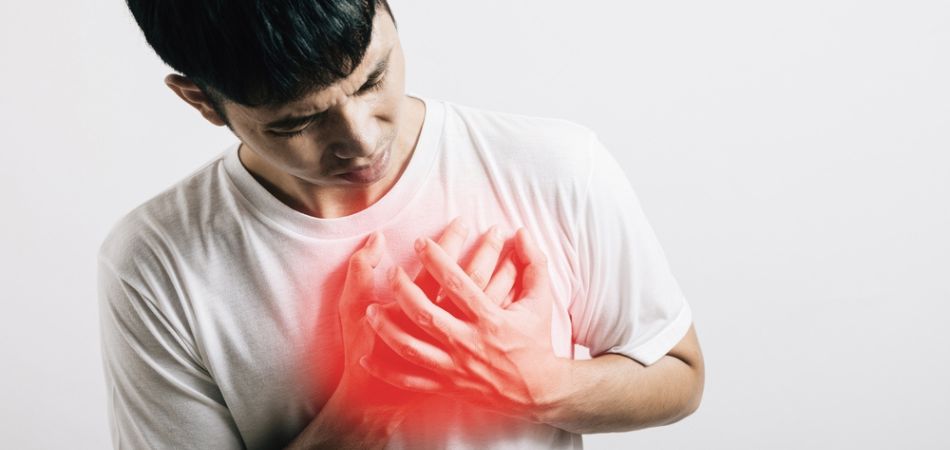Last Updated:
August 29th, 2025
Alcohol is known to damage and impair the function of every organ in the human body. Its deleterious effects will manifest as pains, ranging from sharp to dull, from sudden to lingering. When these pains are localised to your chest, it may be a sign that a problem is worsening.
Are chest pains related to alcohol use?
Regardless of the source of pain, feeling disturbances in your chest can be alarming. The first thing that comes to mind might be “heart attack” or “seizure,” and you might not know how to immediately respond.
Not every chest pain is related to drinking, but there are many types of pain localised in your chest area that are indeed a sign that alcohol is impairing your body. Descriptions of alcohol-related chest pains vary, including burning, stabbing, shooting, dull, or aching.
The chest is a relatively large section of your body, so pains can be related to many different organs, including your heart, lungs, digestive tract, muscles, or even your nervous system. As a result, the exact source of alcohol-related chest pains is not always obvious.
Chest pain might be felt within just a few hours after consuming alcohol, or may be felt the following morning during the hangover. The pains may be more long-term in nature and appear weeks or months after more frequent drinking. Regardless of the type or exact location of your chest pain, you may be receiving a signal that there’s a deeper problem forming in your body after drinking.
What causes chest pains after drinking alcohol?
Alcohol is known to impair or damage almost every major organ in the human body. Many of the organs that alcohol causes damage to will create discomfort, irritation, or pain in your chest, and varying levels of discomfort may be linked to whichever system is affected. Let’s look at some of the most common ways alcohol consumption causes chest pains:
Damage in these areas can result in pain localised to the chest. However, because digestive pain and heart pain sometimes feel similar, it’s important not to mistake one for the other. If you’re experiencing new, unexplained, or worsening chest pain after drinking, you will need to see a healthcare provider.
There are further common effects on your blood pressure and heart rhythms (arrhythmias) after drinking, especially for people with underlying heart issues. Research into alcohol addiction also highlights a condition known as “holiday heart syndrome,” where irregular heartbeats become frequent after a person binge drinks.
This kind of chest pain usually isn’t related to physical damage caused in the body, but it will still very real for many people. If you normally feel panicky or restless the day after drinking, chest pains may be your body’s signal that something has to give and positive changes are needed.
When do I know if chest pain is a medical emergency?
Due to the varying sources of pain and discomfort in the chest area, you may not always know if you should reach out before the pain worsens. You may need to pay very close attention to the type of sensation, how long it lasts and other symptoms that occur alongside it. Here are some factors to consider that a problem may be worsening:
Symptoms that a heart-related event may be approaching
Early signs that a severe heart-related event is approaching include:
- Shortness of breath leading to nausea or cold sweats
- Crushing or radiating pain that reaches your arms, jaw or back
- Decreasing physical capabilities, needing to sit or lie down
- An overwhelming feeling of impending doom with light-headedness
Many of these sensations are linked with panic attacks and potential cardiac arrest. Such severe symptoms shouldn’t be dismissed and likely require medical attention.
How alcohol can downplay serious warning signs
Another dangerous factor to consider when drinking is how alcohol’s sedative effects generally dull pain and impair the way you perceive the pain itself. When you’re drunk, you’re much more likely to downplay the seriousness of your symptoms or delay seeking help when it’s needed.
If your chest pain arises suddenly and feels very different from past chest pains, it may be essential to speak with a healthcare professional. It’s always best to reach out to a professional before a mild symptom becomes a very serious cause for concern.
How can I alleviate chest pains after drinking?
If you’re experiencing chest pains during or after drinking and you feel that the two are linked, it may be essential for you to seek professional help. It may feel like some symptoms are not an immediate cause for concern, but many chest pains we’ve mentioned today are the first signal of a more ominous outcome.
Some of the steps you can take to start managing your chest pains may include:
- Focus on hydration and rest: You may be most likely to experience alcohol-related chest pains during a hangover, and many of a hangover’s symptoms come from being dehydrated. Alcohol is a known diuretic, so you may notice yourself needing to urinate much more when drinking. Make sure that on the following day, you’re drinking enough water to restore the water you’ve lost, as well as making sure you give yourself adequate rest.
- Avoid prolonged lying down and try light exercise: Research from the SleepFoundation highlights how lying down on your side soon after drinking can increase the likelihood of acid reflux. Though it may only be a minor change, sleeping on the left side may help alleviate some reflux-related sleep problems. It may help you to stay upright 30 minutes before sleeping. In addition, try to make sure light exercise is part of your regular routine, outside of times when you’re affected by alcohol.
- Eat gentle foods, low in acid: After a period of heavy drinking, spicy meals or food high in acid may further irritate your stomach or cause heartburn. Be kind to yourself with what you eat, opt for gentle food like fruits high in antioxidants, oats and toast. Choose foods that support digestion and ease any inflammation you feel.
Where can I get help for my alcohol addiction?
If you’ve experienced chest pain after drinking, it might be your body’s way of telling you it’s time for a change. Do not let alcoholism bring you to a point where health problems are a matter of urgency. Warning signs spotted early are much more easily treated, so please don’t feel like you’re alone.
At Recovery Lighthouse, we specialise in delivering tailored medical alcohol detox. Our staff are trained to help you manage uncomfortable withdrawal symptoms, and evidence-based therapy is used to help you reframe and manage addictive behaviours. Our aftercare systems are here to make sure you arrive at a brighter, sober future.
Don’t wait for things to get worse. Reach out to Recovery Lighthouse today. Your health, peace of mind and future are worth it.
(Click here to see works cited)
- “Alcohol’s Effects on the Body.” National Institute on Alcohol Abuse and Alcoholism, U.S. Department of Health and Human Services, www.niaaa.nih.gov/alcohols-effects-health/alcohols-effects-body
- “How Alcohol Affects Blood Pressure and the Heart.” HSE.Ie, www2.hse.ie/living-well/alcohol/health/effects-on-your-body/blood-pressure
- Jain A, Yelamanchili VS, Brown KN, et al. Holiday Heart Syndrome. [Updated 2024 Jan 16]. In: StatPearls [Internet]. Treasure Island (FL): StatPearls Publishing; 2025 Jan-. Available from: https://www.ncbi.nlm.nih.gov/books/NBK537185/
- “Why Does Alcohol Make You Pee More?” Drinkaware, www.drinkaware.co.uk/facts/health-effects-of-alcohol/general-health-effects/why-does-alcohol-make-you-pee-more
- “How to Sleep Better with Gerd.” Sleep Foundation, 3 Apr. 2024, www.sleepfoundation.org/physical-health/gerd-and-sleep.



